
Matthew 3 is the third chapter of the Gospel of Matthew in the New Testament. It is the first chapter dealing with the ministry of Jesus, with events taking place some three decades after the close of the infancy narrative related in the previous two chapters. The focus of this chapter is on the preaching of John the Baptist and the Baptism of Jesus.

Matthew 3:7 is the seventh verse of the third chapter of the Gospel of Matthew in the New Testament. The verse occurs in the section introducing John the Baptist. In this verse John attacks the Pharisees and Sadducees.

Matthew 3:8 is the eighth verse of the third chapter of the Gospel of Matthew in the New Testament. The verse occurs in where John the Baptist is berating the Pharisees and Sadducees. He has previously called them a brood of vipers and warned them of the wrath to come. In this verse he urges them to repent.

Matthew 3:9 is the ninth verse of the third chapter of the Gospel of Matthew in the New Testament. The verse describes an incident where John the Baptist berates the Pharisees and Sadducees. He has previously called them a brood of vipers and warned them of the wrath to come and has urged them to repent. In this verse he warns that their links to Abraham will not save them.

Matthew 4:3 is the third verse of the fourth chapter of the Gospel of Matthew in the New Testament. This verse opens the section in Matthew dealing with the temptation of Christ by Satan. Jesus has been fasting for forty days and forty nights, and in this verse the devil gives Christ his first temptation by encouraging him to use his powers to get food.
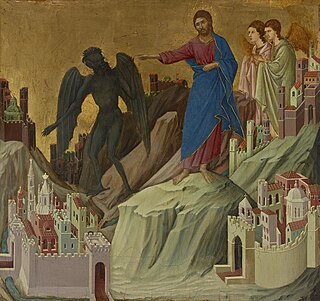
Matthew 4:8 is the eighth verse of the fourth chapter of the Gospel of Matthew in the New Testament. Jesus has just rejected Satan's second temptation. In this verse the devil transports Jesus to a new location for the third temptation.
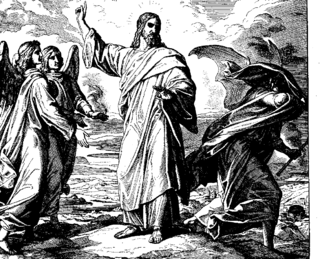
Matthew 4:10 is the tenth verse of the fourth chapter of the Gospel of Matthew in the New Testament. Jesus has rebuffed two earlier temptations by Satan. The devil has thus transported Jesus to the top of a great mountain and offered him control of the world to Jesus if he agrees to worship him. In this verse, Jesus rejects this temptation.

Matthew 4:18 is the eighteenth verse of the fourth chapter of the Gospel of Matthew in the New Testament. Jesus has just begun preaching in Galilee. In this verse he encounters the first of his disciples.

Matthew 4:19 is the nineteenth verse of the fourth chapter of the Gospel of Matthew in the New Testament. Jesus has just begun preaching in Galilee and has encountered the fishermen Simon Peter and Andrew. In this verse he calls the pair to follow him.

Matthew 5:14 is the fourteenth verse of the fifth chapter of the Gospel of Matthew in the New Testament. It is part of the Sermon on the Mount, and is one of a series of metaphors immediately following the Beatitudes.

Matthew 5:18 is the eighteenth verse of the fifth chapter of the Gospel of Matthew in the New Testament and is part of the Sermon on the Mount. In the previous verse, Jesus has stated that he came not to destroy the law, but fulfill it. In this verse, this claim is reinforced.

Matthew 6:18 is the eighteenth verse of the sixth chapter of the Gospel of Matthew in the New Testament and is part of the Sermon on the Mount. This verse concludes the discussion of fasting.
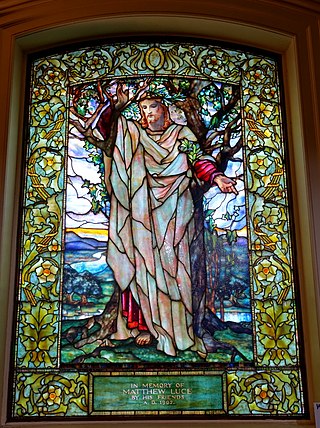
Matthew 6:23 is the twenty-third verse of the sixth chapter of the Gospel of Matthew in the New Testament and is part of the Sermon on the Mount.
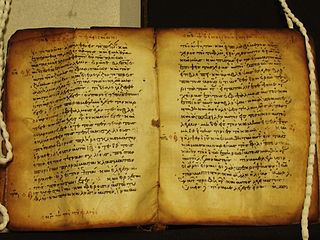
Mark 8 is the eighth chapter of the Gospel of Mark in the New Testament of the Christian Bible. It contains two miracles of Jesus, Peter's confession that he believes Jesus is the Messiah, and Jesus' first prediction of his own death and resurrection. It is the middle chapter of the gospel but its significance is variously understood: for example the Jamieson-Fausset-Brown Bible Commentary calls it a "section of miscellaneous matter", whereas many commentators treat it as a turning point where Mark's description of Jesus as teacher and miracle worker gives way to his focus on the role of Jesus' death and the difficult nature of his teachings.

Matthew 7:9 is the ninth verse of the seventh chapter of the Gospel of Matthew in the New Testament and is part of the Sermon on the Mount. This verse presents the first of a pair of metaphors explaining the benefits of prayer.
Matthew 16 is the sixteenth chapter in the Gospel of Matthew in the New Testament section of the Christian Bible. Jesus begins a journey to Jerusalem from the vicinity of Caesarea Philippi, near the southwestern base of Mount Hermon. Verse 24 speaks of his disciples "following him".

John 6 is the sixth chapter of the Gospel of John in the New Testament of the Christian Bible. It records Jesus' miracles of feeding the five thousand and walking on water, the Bread of Life Discourse, popular rejection of his teaching, and Peter's confession of faith. The final verses anticipate Jesus' betrayal by Judas Iscariot.
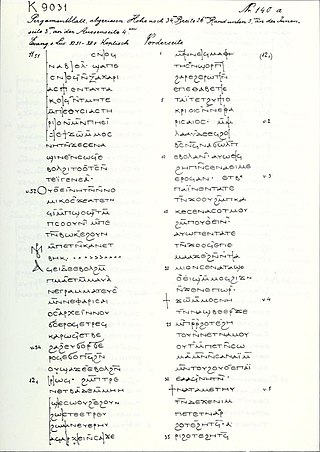
Luke 11 is the eleventh chapter of the Gospel of Luke in the New Testament of the Christian Bible. It records Luke's version of the Lord's Prayer and several parables and teachings told by Jesus Christ. The book containing this chapter is anonymous, but early Christian tradition uniformly affirmed that Luke the Evangelist composed this Gospel as well as the Acts of the Apostles.

Matthew 8:12 is the twelfth verse of the eighth chapter of the Gospel of Matthew in the New Testament. This verse is part of the conclusion to the miracle story of healing the centurion's servant, the second of a series of miracles in Matthew. This verse warns that many Jews are lacking in faith after praising the Gentile Centurion in the previous verse for his.
Matthew 9:34 is a verse in the ninth chapter of the Gospel of Matthew in the New Testament.


















